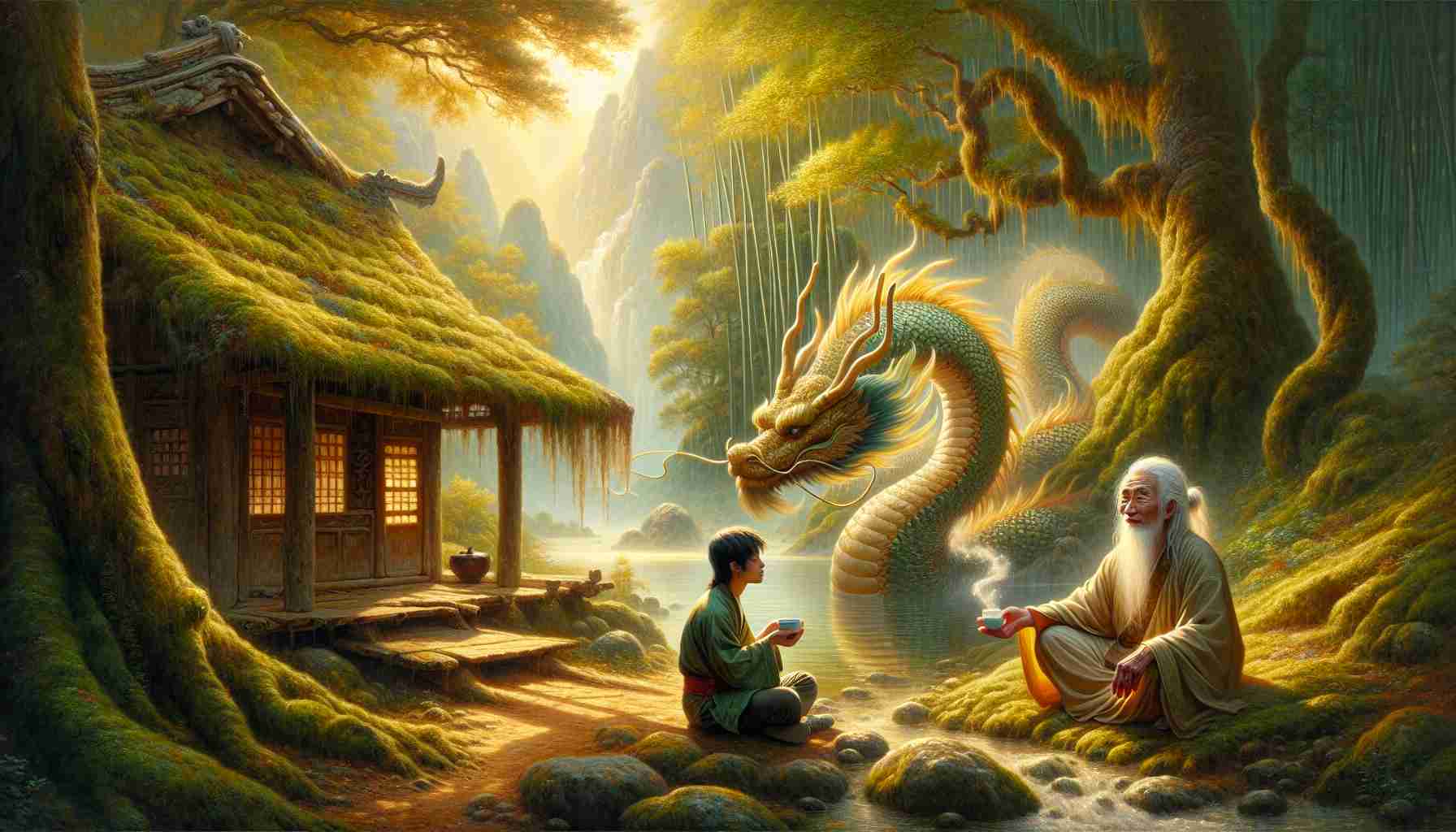

I had always adored dragons. I drew them, talked about them, dreamed about them. Big dragons with golden eyes, tiny ones with wings like leaves—I loved them all. My bedroom walls were covered in pictures, and I even carried a small wooden dragon in my pocket everywhere I went.
One day, I heard about an old man who lived in the mountains. They said he spent his life studying strange things—wind, dreams, and even dragons! So I climbed the long path past whispering bamboo trees and mossy rocks until I found his tiny hut.
He was making tea when I arrived. His hair was white like the mist, and his eyes looked like they'd seen a thousand winters.
“You love dragons,” he said, smiling before I even told him. “Why don’t you come see one?”
My heart leapt. “You’ve seen real dragons?”
He nodded slowly. “But first, tell me—what do you love most about them?”
I started listing things: their fire, their speed, their beauty, how they roared and flew through storms. He listened, sipping tea, without saying a word.
Then he took me behind his hut and pointed to a small, still pond.
“There,” he whispered.
At first, I thought he was joking. The pond was quiet, just reflecting the clouds.
Then, ripples appeared. A shape rose from the water, long and smooth and shining. A dragon!
But it wasn’t like in my drawings. It was soft, silent, and didn’t even roar. Its scales shimmered, almost disappearing into the sky. I froze.
“You can go closer,” the man said.
But I couldn’t move. My legs shook. My hands sweated. I wanted to run.
“I thought you loved dragons,” he said gently.
“I... I do! But this is real! It’s too much!"
The man smiled. “Ah. That’s just it. You loved the idea of dragons, not the thing itself.”
He let me sit for a while. The dragon dipped back into the pond and was gone.
Later, as we walked back, I asked, “Why wasn’t it breathing fire or flying?”
“Because real dragons don’t need to force anything,” he said. “They simply are. That is Wu Wei—no forcing, no grabbing. Just being, like the wind or the water.”
“And I... I was trying too hard,” I whispered.
He nodded. “Your love became a trap. You tried to hold too tightly, so you missed what was right in front of you.”
That night, I didn’t draw any dragons. Instead, I sat quietly at home, listening to the wind outside. It moved the trees without effort. It didn’t roar like a dragon from my stories—but I could feel its power.
Now, when I think of dragons, I don’t picture fire or thunder. I remember the quiet dragon in the pond. Gentle, strong, and free. Just like the Tao.
I didn’t stop loving dragons. But I stopped chasing them.
And in that stillness, I found something even better—I found peace.
I had always adored dragons. I drew them, talked about them, dreamed about them. Big dragons with golden eyes, tiny ones with wings like leaves—I loved them all. My bedroom walls were covered in pictures, and I even carried a small wooden dragon in my pocket everywhere I went.
One day, I heard about an old man who lived in the mountains. They said he spent his life studying strange things—wind, dreams, and even dragons! So I climbed the long path past whispering bamboo trees and mossy rocks until I found his tiny hut.
He was making tea when I arrived. His hair was white like the mist, and his eyes looked like they'd seen a thousand winters.
“You love dragons,” he said, smiling before I even told him. “Why don’t you come see one?”
My heart leapt. “You’ve seen real dragons?”
He nodded slowly. “But first, tell me—what do you love most about them?”
I started listing things: their fire, their speed, their beauty, how they roared and flew through storms. He listened, sipping tea, without saying a word.
Then he took me behind his hut and pointed to a small, still pond.
“There,” he whispered.
At first, I thought he was joking. The pond was quiet, just reflecting the clouds.
Then, ripples appeared. A shape rose from the water, long and smooth and shining. A dragon!
But it wasn’t like in my drawings. It was soft, silent, and didn’t even roar. Its scales shimmered, almost disappearing into the sky. I froze.
“You can go closer,” the man said.
But I couldn’t move. My legs shook. My hands sweated. I wanted to run.
“I thought you loved dragons,” he said gently.
“I... I do! But this is real! It’s too much!"
The man smiled. “Ah. That’s just it. You loved the idea of dragons, not the thing itself.”
He let me sit for a while. The dragon dipped back into the pond and was gone.
Later, as we walked back, I asked, “Why wasn’t it breathing fire or flying?”
“Because real dragons don’t need to force anything,” he said. “They simply are. That is Wu Wei—no forcing, no grabbing. Just being, like the wind or the water.”
“And I... I was trying too hard,” I whispered.
He nodded. “Your love became a trap. You tried to hold too tightly, so you missed what was right in front of you.”
That night, I didn’t draw any dragons. Instead, I sat quietly at home, listening to the wind outside. It moved the trees without effort. It didn’t roar like a dragon from my stories—but I could feel its power.
Now, when I think of dragons, I don’t picture fire or thunder. I remember the quiet dragon in the pond. Gentle, strong, and free. Just like the Tao.
I didn’t stop loving dragons. But I stopped chasing them.
And in that stillness, I found something even better—I found peace.